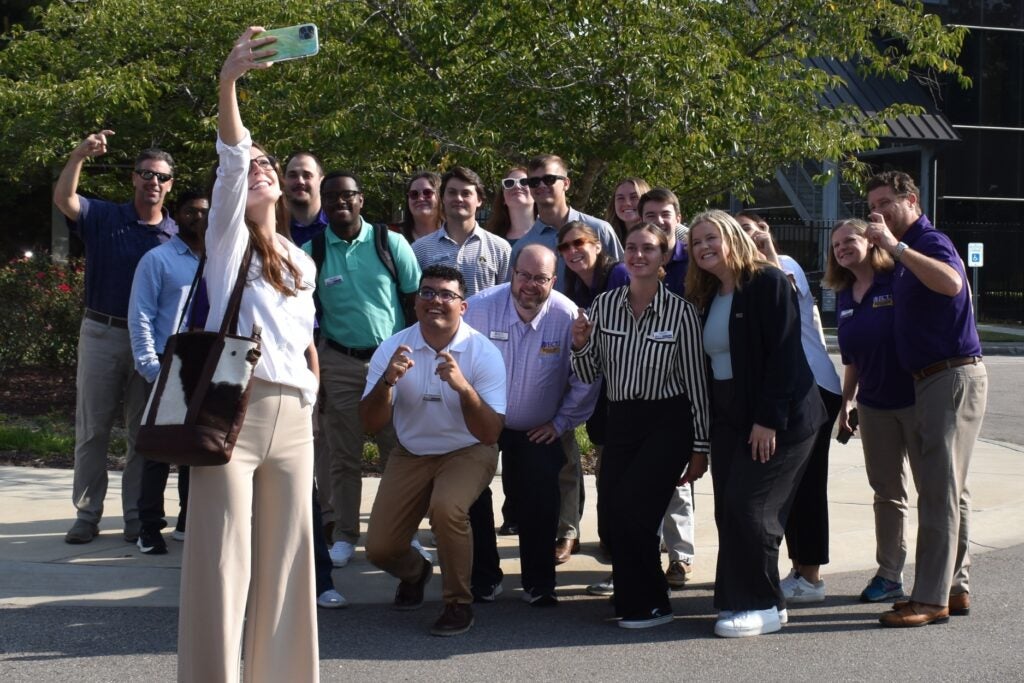September 18, 2024
New IMBA cohort named, settling in to their routine

The second cohort of the Immersive MBA pathway hit the ground running as soon as classes started in August.
The group of 16 graduate students has already toured Thermo Fisher Scientific, attended a social sponsored by the Arthur School Advisory Board’s chair, started their graduate assistant work, and settled into their classes. They are already looking ahead with a planned fall trip to Atlanta, scheduled meetings with the COB advisory board, and participation in the COB’s fall networking event. And, talks have already begun regarding their mandatory summer internship.
All of this, and they have not officially been announced yet.
Until now.
The second Immersive MBA cohort
The Arthur School is proud to announce the second cohort of the Immersive MBA Pathway, who include:
- Rodney Bonilla Gonzalez, marketing and supply chain management, Apex, N.C.
- Jackson Bostic, accounting, Elizabethtown, N.C.
- Kyleigh Burton, dance performance and choreography, Roxboro, NC
- Christopher Chesley, management information systems, Warrenton, Va.
- Jack Dyba, sports studies, Greenville, N.C.
- Fiona Freyholtz, marketing, Sneads Ferry, N.C.
- Emma Gebel, management, Greensboro, N.C.
- Craig Geter, management information systems, Fort Liberty, N.C.
- Jordan Hatch, management information systems, Locust, N.C.
- Isabella Jimenez Vargas, management, Wendell, N.C.
- Matthew Kornegay, management, Mount Olive, N.C.
- Jay Patel, finance, Greenville, N.C.
- Lily Puett, management Franklinton, N.C.
- Sarah Ragsdale, marketing, Wake Forest, N.C.
- Katie Rowland, entrepreneurship, Apex, N.C.
- Hunter Wilson, management, Goldsboro, N.C.
More information about the second cohort can be found on the Immersive MBA web page.
What can the second cohort expect?
The goal of the IMBA pathway is to provide students with meaningful work experience by matching them with companies looking to fill leadership training and management-track positions. The students will take their classes together with select faculty and will complete their MBA in one year. The curriculum is the same core courses required of all ECU MBA students, which is flexible to allow students to fit their MBA pursuit into their current work schedule or lifestyle.
Each IMBA student receives a full scholarship and a paid graduate assistantship position for an investment of $25,000 per student. They will receive additional compensation for their internship.
The IMBA is open for any ECU undergraduate to participate, and both Burton and Dyba, two students coming from outside the College of Business, continue that trend in year two of the pathway.
“Through the IMBA pathway, I hope to fuel my entrepreneurial spirit and gain confidence in my ability to combine the arts and business,” said Burton.
Dyba adds, “I hope to gain a comprehensive understanding of business administration and its components while also equipping myself with necessary and useful skills as I enter into my professional career.”
“The second cohort of IMBAs is poised to make an impact in eastern North Carolina and beyond, and I am excited to see what this group accomplishes,” said Linda Quick, assistant dean of the Arthur School of Business.
Like the inaugural cohort, the second cohort plans to take advantage of all the opportunities that are coming their way, opportunities that might not have made their way to any stories, blogs or social media posts.
“I hope to gain a tight-knit group of friends who are like-minded, high-achieving individuals who will push me to be the best person I can be,” said Kornegay.
Geter echoed Kornegay’s sentiments, “I am hoping to build life-long connections through the Immersive MBA program’s cohort.”
Something new
There’s one new area the second cohort will experience that the first cohort did not, and that’s public service.
Students will be divided into three teams to complete a community impact project in eastern North Carolina. They will spend the fall semester selecting their projects and learning key leadership competencies to use in implementing their idea. Then, in the spring semester, teams will go out and implement a project that leaves a lasting impact on the community. The impetus of this new project requirement was IMBA alumni Carter Cunningham’s “Homers that Help” project from 2023-24, which raised over $50,000 for ECU Health Children’s Hospital.
- Categories:
- Uncategorized
